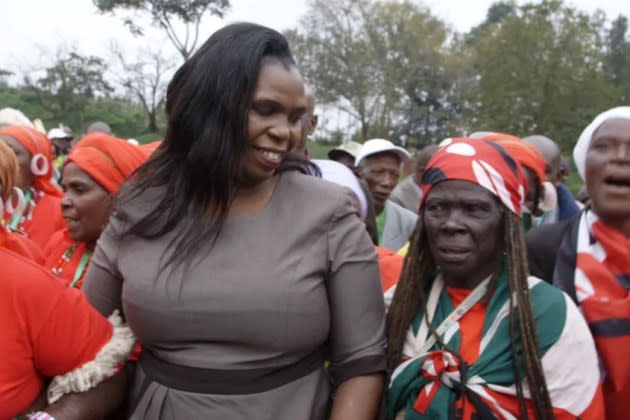‘Monsoon Wedding’s’ Mira Nair Boards ‘Our Land, Our Freedom’: ‘Colonization Has Robbed Us of Our Land, But Not Our Voices (EXCLUSIVE)

Oscar-nominated filmmaker Mira Nair (“Salaam Bombay!”) has come on board to executive produce “Our Land, Our Freedom,” from directors Meena Nanji and Zippy Kimundu, ahead of the film’s world premiere at IDFA, which takes places in Amsterdam Nov. 8 – 19. The documentary feature will screen as part of the festival’s Frontlight strand.
“Our Land, Our Freedom” follows Wanjugu Kimathi, daughter of the legendary leader of the Kenyan Land and Freedom Army, or Mau Mau Rebellion, Dedan Kimathi. When the resistance figure was hanged by the British authorities in 1957 for possession of firearms, his body was dumped at an unknown location. Now, Wanjugu follows in her mother’s footsteps to look for her father’s remains.
More from Variety
Over the course of the film, Wanjugu’s search becomes an investigation into British colonial atrocities including concentration camps and land theft that left hundreds of thousands of Kenyans destitute. Along the way she meets Mau Mau veterans, families of others who lost their land, and inspiring activists. As her mission expands, Wanjugu transforms into a powerful advocate championing justice and land resettlement for those dispossessed.
“Our Land, Our Freedom” is produced by Eliane Ferreira for Muiraquitã Filmes, Meena Nanji for Twende Pictures and Zippy Kimundu for Afrofilms International Ltd., in co-production with Gudula Meinzolt and Paulo de Carvalho for Autentika Films.
The groundbreaking Indian-American director Nair is best known for films including “Salaam Bombay!” (1988), which won the Camera d’Or at the Cannes Film Festival and was nominated for an Academy Award; the romantic drama “Mississippi Masala” (1991), starring Denzel Washington; and the boisterous “Monsoon Wedding” (2001), which won the Golden Lion at the Venice Film Festival, marking the first time a woman took home the top honors on the Lido. The film has since been adapted into a hit musical.
“Ancestral voices are powerful indeed. We live in a world where colonization has robbed us of our land, but not our voices,” said Nair. “‘Our Land, Our Freedom’ is an epic and intimate film about the quest to consecrate the Mau Mau rebellion against British rule in Kenya. About time, I say. I am honored to be the executive producer of the film, directed beautifully by Meena Nanji and Zippy Kimundu.”
Nanji is a third-generation Kenyan of South Asian heritage who said she’d wanted to make a film about Kenya’s independence movement since she first learned about the colonial-era concentration camps through Caroline Elkins’ book “The British Gulag.”
“Part of my drive to make the film is to contribute to the ongoing struggle for justice to those who fought for Kenya’s freedom, which was also my freedom,” she said. “I was born into an independent Kenya, which, in the early days, carried with it all the hopes and aspirations that anti-colonial movements of the 1960s had. This spirit has imbued me throughout my life. Yet justice has not yet been attained in Kenya.”
Nanji expressed her conviction that “it is time for the truth to be unearthed, and for colonial accountability that can help forge a path to justice,” adding: “I would like to do what I can to contribute to this effort.”
Co-director Kimundu had been looking into her own family’s colonial-era history when she and Nanji met and decided to collaborate on “Our Land, Our Freedom.” “When I was growing up, none of the adults around me spoke much about colonialism and how it had affected them,” she said. “Later, I came to learn that this was part of a ‘collective vow of silence’ that many Kenyans took in reaction to a government-imposed ban on the Mau Mau soon after Kenya’s independence.”
Only when she began working on the film did Kimundu learn about the divisions within her own family during the independence struggle, a divide that resulted in her father being separated from his ancestral home. “Our Land, Our Freedom,” she said, reflects her core belief in films “that will create impact and influence positive change in our communities.”
Producer Eliane Ferreira pointed to her own roots as one of the reasons she decided to get involved with the Kenya-set project. “Being Brazilian and having grown up in a country that was colonized and deeply marked by slavery undoubtedly brought me closer to the film that Zippy and Meena were making,” she said. “To tell the story of Kenya through the documentary ‘Our Land, Our Freedom’ is to be on the right side of how we should discuss colonization and think about decolonization.
“Everyone needs to think about the consequences of the abuses committed during colonization and what each person can and should do so that we can transform a reality that still places many peoples in a situation of extreme poverty and inequality.”
Best of Variety
Sign up for Variety’s Newsletter. For the latest news, follow us on Facebook, Twitter, and Instagram.

